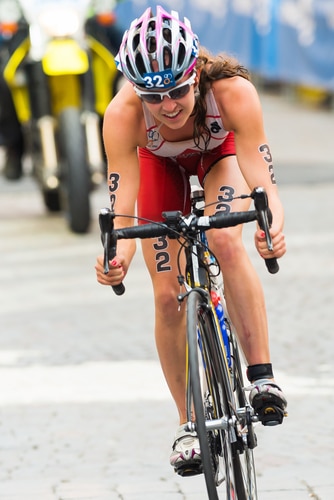Traditionally, endurance athletes have viewed weight as something to be reduced. The thinking was the lighter, the better. But there’s a reason to take that recommendation with a grain of salt as a triathlete. At some point, strength can be lost if you get too thin. Further, your ideal weight may depend on the duration of your event.
Body Fat
Body fat percentage in elite male triathletes ranges from six to 12 percent, and in elite women from 15 to 23 percent. Women tend to store more fat than men. This difference is likely due to the female hormone, estrogen, which promotes fat storage. There are other factors, such as VO2 Max, and lactic threshold that affect finishing time, but if two athletes have the same power output, then the lighter athlete will finish first. Studies have shown a correlation between body fat percentage and finishing times in elite men. Usually, the leaner men finish first. However, no such correlation was found in elite women.
Type of Racing
Your ideal body weight may depend on the type of racing that you’re doing. Chris McCormack started off racing short distance triathlons and was the World Champion in 1997. He has since been the Ironman World Champion in 2007, 2010 and the ITU Long Distance World Champion in 2012. McCormack says that, in shorter distance triathlons, lean is the way to go. However, to power through nine hours in an Ironman event, you need to be robust. Between his 2005 and 2006 racing seasons, McCormack put on six pounds, going from 165 to 171 pounds and found he felt stronger and raced better with the extra weight at the Ironman distance.
Upper Body Strength
While the top triathletes have a very low body fat percentage, they tend to have much more powerful upper bodies than athletes competing in other endurance sports such as runners or cyclists. Triathletes need strength in their shoulders and upper bodies to propel themselves during the swim. This could be lean muscle mass in the shoulders, but it certainly affects the look of triathletes. The ideal for body fat percentage for triathletes is low, but due to the multi-sport aspect of triathlon, total body strength is still required and the best triathletes will be a bit heavier than the top competitors in other endurance sports.
Consequences of Losing Weight Too Fast
Triathletes may be tempted to lose weight to get that edge on race day. Keep in mind that it’s not healthy losing more than a pound a week for a sustained period. Sometimes, the first week or two of a diet might lead to more significant weight loss, but after the first couple weeks try to lose no more than a pound per week. Over the long run, this weight loss will add up. Consequences of losing weight too fast include moodiness, muscle loss, increased susceptibility to sickness, menstrual irregularities, and headaches.
References:
Triathlete: Chris McCormack On The Triathlete Weight Debate
Donald Hensrud, M.D.: Why do doctors recommend a slow rate of weight loss? What’s wrong with fast weight loss?
WebMD: Rapid Weight Loss
Related Articles By Cathe:
3 Tests that Outperform BMI for Monitoring Obesity & Health Risks
5 Reasons to Ditch Restrictive Dieting


